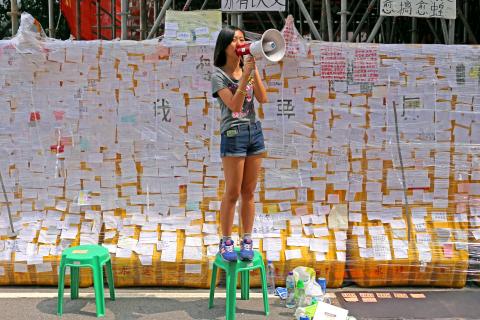Tensions in Hong Kong soared yesterday after police were seen unloading boxes of tear gas and rubber bullets close to the territory’s besieged government headquarters as the authorities urged pro-democracy demonstrators to disperse “as soon as possible.”
Protesters have shut down central areas of the territory with a mass sit-in, including outside the Legislative Council building, and had given Hong Kong Chief Executive Leung Chun-ying (梁振英) until midnight last night to step down, or face escalated action.
China backed the territory’s embattled leader, saying it was behind Leung “firmly and unshakably” and pledged support for the police as protesters prepared for a fifth night on the barricades.

Photo: AFP
Days of peaceful demonstrations have seen tens of thousands of people take over Hong Kong’s usually traffic-heavy streets as they demand Beijing grant fully free elections in the semi-autonomous territory.
Last month, China said Hong Kongers would be able to vote for their next leader in 2017, but only those vetted by a loyalist committee would be allowed to stand — something demonstrators have dismissed as a “fake democracy.”
Hong Kong authorities said yesterday they wanted the streets cleared around the government headquarters, with more than 3,000 civil servants expected to return to the headquarters after a two-day public holiday.
In a statement, officials called on protesters “not to block the access there and to disperse peacefully as soon as possible.”
The late afternoon resupply by police officers caused widespread alarm among protesters as their leaders issued fresh calls for people to swell their ranks.
Pictures shared widely on social media and television showed one barrel with the words “round, 38mm rubber baton multi” written on it. Another had “1.5 in CS” emblazoned on it, a possible reference to CS gas.
The Chinese Communist Party has shown no sign of bowing to protesters’ twin demands. An editorial in party mouthpiece the People’s Daily yesterday warned against chaos in the territory, adding that Beijing supported “the police of the special territory in handling these illegal protests according to the law.”
The demonstrators consider Leung a Beijing stooge and protest leaders wanted yesterday’s ultimatum to be met.
“We will consider having different operating actions in future days, including occupying other places, like important government offices,” said Agnes Chow (周庭) of the student movement Scholarism.
Analysts say it is unlikely that Leung will step down, in what would be a massive loss of face for the establishment.
“If Beijing forces him to resign, they will be seen to be buckling under pressure from the protesters. They might give out signals that he has been sidelined, but the likelihood of his immediate dismissal... is not very high,” said Willy Lam (林和立), Chinese University of Hong Kong professor.
However, Lam added that the longer the protests affect Hong Kong, the more pressure Chinese President Xi Jinping (習近平) would be under to act.

A magnitude 7.0 earthquake struck off Yilan at 11:05pm yesterday, the Central Weather Administration (CWA) said. The epicenter was located at sea, about 32.3km east of Yilan County Hall, at a depth of 72.8km, CWA data showed There were no immediate reports of damage. The intensity of the quake, which gauges the actual effect of a seismic event, measured 4 in Yilan County area on Taiwan’s seven-tier intensity scale, the data showed. It measured 4 in other parts of eastern, northern and central Taiwan as well as Tainan, and 3 in Kaohsiung and Pingtung County, and 2 in Lienchiang and Penghu counties and 1

FOREIGN INTERFERENCE: Beijing would likely intensify public opinion warfare in next year’s local elections to prevent Lai from getting re-elected, the ‘Yomiuri Shimbun’ said Internal documents from a Chinese artificial intelligence (AI) company indicated that China has been using the technology to intervene in foreign elections, including propaganda targeting Taiwan’s local elections next year and presidential elections in 2028, a Japanese newspaper reported yesterday. The Institute of National Security of Vanderbilt University obtained nearly 400 pages of documents from GoLaxy, a company with ties to the Chinese government, and found evidence that it had apparently deployed sophisticated, AI-driven propaganda campaigns in Hong Kong and Taiwan to shape public opinion, the Yomiuri Shimbun reported. GoLaxy provides insights, situation analysis and public opinion-shaping technology by conducting network surveillance

‘POLITICAL GAME’: DPP lawmakers said the motion would not meet the legislative threshold needed, and accused the KMT and the TPP of trivializing the Constitution The Legislative Yuan yesterday approved a motion to initiate impeachment proceedings against President William Lai (賴清德), saying he had undermined Taiwan’s constitutional order and democracy. The motion was approved 61-50 by lawmakers from the main opposition Chinese Nationalist Party (KMT) and the smaller Taiwan People’s Party (TPP), who together hold a legislative majority. Under the motion, a roll call vote for impeachment would be held on May 19 next year, after various hearings are held and Lai is given the chance to defend himself. The move came after Lai on Monday last week did not promulgate an amendment passed by the legislature that

AFTERMATH: The Taipei City Government said it received 39 minor incident reports including gas leaks, water leaks and outages, and a damaged traffic signal A magnitude 7.0 earthquake struck off Taiwan’s northeastern coast late on Saturday, producing only two major aftershocks as of yesterday noon, the Central Weather Administration (CWA) said. The limited aftershocks contrast with last year’s major earthquake in Hualien County, as Saturday’s earthquake occurred at a greater depth in a subduction zone. Saturday’s earthquake struck at 11:05pm, with its hypocenter about 32.3km east of Yilan County Hall, at a depth of 72.8km. Shaking was felt in 17 administrative regions north of Tainan and in eastern Taiwan, reaching intensity level 4 on Taiwan’s seven-tier seismic scale, the CWA said. In Hualien, the